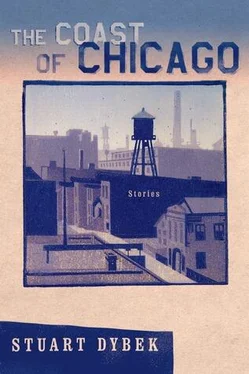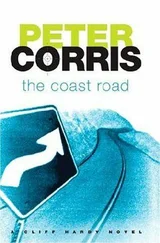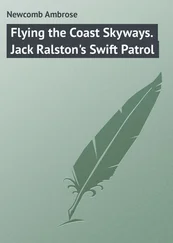A journalist for the Voice will write: “Uncompromisingly powerful, it demands to be seen, though a film like this might be better kept secret, protected from the corrupting influence of the Hollywood glamour and promotion machine, the invidious American penchant for reducing substance to marketable style.”
While another reviewer, writing for a more conservative publication will comment: “This looks like the year for Terrorist Cinema. Another fad pretending to usher in a change of consciousness but lacking the moral imperative of the civil rights movement and peace marches that launched the 6os.”
The audience files out through the mirrored lobby, backs turned on the posters of stars, out under the winking marquee, squinting at the pink smolder of dusk. Behind them, on the silver screen in the houselit theater, a final frame hovers like the ghost image phenomena sometimes haunting TV screens, a blown-up image that could only have been shot by a camera implanted in a mouth, of an indigo tongue working at a husk of popcorn stuck in a gold-capped molar.
And across this image a delayed rolling of credits begins: the names of actors, writers, cameramen, assistant director, director, producer, editors, sound, music, makeup, gaffers, soldiers, officers, generals, politicians — a cast of thousands — workers, students, peasants, the audience, the victims, the maimed, the maddened, the myriad names of the dead.
Her hands were always scratched from sparring with cats.
I used to watch her out walking some mutt she said she’d found the same way she’d found men.
For years she’d open her house to whatever stray showed up. She never caged them, let them wander in and out of her life — dogs, cats, rabbits, birds….
It seemed she was constantly nursing some kind of bird. Convalescent pigeons would return, roosting and cooing in the eaves above the doorstep where she sprinkled hard corn.
“The starlings never live,” she said, “you can’t cure a starling.”
There would be saucers everywhere, some stained with milk, others brimming with dirty rainwater. She believed in the curative powers of rain.
“I never give any of them names. We don’t know an animal’s name. A name’s what we use instead of smelling.”
Silhouettes
The alley became a river in the rain — a river with currents of clattering cans and a floe of cardboard. The boy would wake to the headlights of lightning spraying the walls of his small room, and lie listening to the single note of drops pinging the metal hood of a blue bulb that glowed above a garage door. Finally, he’d go to the window and look down.
The blue bulb gave the rain a bluish gleam. Rotted drainpipes gushed like dislocated fountains. Flooded tar roofs seemed to tilt, spilling waterfalls through sluices of fire escapes.
At the mouth of the alley, a streetlight swirled, slowly disappearing down the whirlpool of a sewer. And beyond the aura of the streetlight, on a street whose name and numbers had been washed away, shadows moved aimlessly through rain. Tonight, they had their collars raised. He could catch glimpses of them passing by the mouth of the alley. Even when he couldn’t see them, he could sense their presence: shapes that he’d named silhouettes , shadows that threw shadows, that inhabited the hourless times of night stolen from dreams when it seemed to the boy as if he’d been summoned awake only to lie there wondering for what reason he’d been summoned. He couldn’t remember when he’d become aware of their presence, or when he first thought of them as silhouettes. He had never thought of them as anything else — not ghosts, or spirits. Silhouettes were enough to haunt him.
Others had their own names for shadows. Downstairs, the Ukrainian kid who practiced the violin slept with his arms extended in the shape of a cross to ward off the dead. Across the alley, in a basement flat, a Puerto Rican girl prayed as if begging before a vigil candle flickering the picture of the Virgin on her bureau, and sometimes the smell of the coal furnace behind the grate that opened on purgatory would fade into a faint scent of roses. There were guys who carried knives taped inside their socks to school, who still slept at the edges of their beds in order to leave room for their guardian angels. There were girls who wore mascara like a mask, who swore they’d seen Niña, the beautiful high school girl who had plunged from a roof one summer night. Niña had sneaked out that night to meet her boyfriend, Choco, a kid who played the conga and had gone AWOL to see her. Choco, his conga drum strapped over his shoulder, had led her up a fire escape to the roof where he slept on an old mattress. They took angel dust, which made the moon seem near enough to step onto from the roof. The girls said that on moonlit nights music would wake them — a song whose beat they all recognized, though none of them could hum back its melody — and they would see a fantasma , Niña, her hair flying and blouse billowing open, falling past their windows, but falling so slowly that it seemed as if it might take forever for her to hit the street.
And there were apparitions in broad daylight: the mute knifesharpener pushing his screeching whetstone up alleys; the peddlers with clothesline whips flicking blindered horses as their wagons rumbled by tottering under jumbled loads of uprooted cellars and toppled attics; the hunchbacked woman who walked bent from the waist as if doubled over by the weight of the lifetime’s length of filthy, gray hair that streamed from her bowed head and swept the pavement before her.
They seemed part of the streets. If anyone noticed, it was only to glance away, but the boy secretly regarded them as if he were witnessing refugees from a cruel fairy tale groping their way through the ordinary world. He wondered where they disappeared to, where they slept at night, and what they dreamed.
Beside the daytime apparitions, the silhouettes seemed nearly invisible, camouflaged by night, shadows who’d broken their connections to whatever had thrown them, and now wandered free, like dreams escaped from dreamers. They emerged from viaducts on nights when viaducts exhaled fog and manhole covers steamed. Where they stood in dripping doorways, they made the doorways darker. When they stepped into the open — shadows, but shadows no longer supported by walls or trailed along pavement — the rain, slanting through the glow of streetlights and shop signs, beaded off them like molten electricity. Oncoming headlights bent around them; flashes of lightning traced their outlines. The boy could sense them moving along the street and wondered if tonight was the night for which he’d been summoned awake, when the silhouettes would finally come up the alley, past the guardian streetlight now swirling and sinking, and assemble below his window, looking up at his face pressed against the spattered pane, their eyes and mouths opened onto darkness like the centers of guitars.
Love, it’s such a night, laced with running water, irreparable, riddled with a million leaks. A night shaped like a shadow thrown by your absence. Every crack trickles, every overhang drips. The screech of nighthawks has been replaced by the splash of rain. The rain falls from the height of streetlights. Each drop contains its own shattering blue bulb.
I knew a girl who laughed in her sleep. She had been in the States only a year and I wondered if being foreign didn’t have something to do with her laughing that way. Her eyes were a gold-flecked green more suited to cats, and ringed with the longest lashes I’d ever seen. In the right light her half-lowered lashes threw small shadows across her face. She didn’t look American yet. Once I woke her and asked what was so funny. She seemed confused and a little embarrassed, and I never asked her again.
Читать дальше












